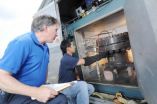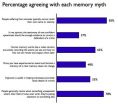August 2011 GSA Today science: Understanding Earth's eroding surface with 10Be
2011-08-04
(Press-News.org) Boulder, Colorado, USA - The August GSA TODAY science article is now online at http://www.geosociety.org/gsatoday/archive/21/8/.
The modification of Earth's surface by erosion is one of the most important geological processes in terms of its impact on society, as well as its influence on the geological record, but geologists have been lacking a well-determined compilation of pre-human rates of erosion. In a groundbreaking compilation of 1528 calculations of surface erosion rates from 80 study areas from all over the world, authors Eric Portenga and Paul Bierman of the University of Vermont provide a valuable look at how rates of erosion vary in differing climates and tectonic settings in the recent geological past.
The erosion rates in their compilation are determined by measuring the abundance of radioactive isotopes produced in rocks exposed to cosmic radiation at Earth's surface. Their compilation has found that bare rock outcrops had significantly lower rates of erosion than surfaces covered with even thin layers of soil, pointing out the global importance of soil formation as a geomorphic process. They also found several factors that are most important to erosion rates; not surprisingly, the highest rates of erosion in the recent geologic past occur in drainage basins and in areas with the steepest slopes. The analysis of their compilation has revealed that variations in global and regional erosion rates are best explained by an interaction of several processes including surface slope and elevation, tectonic activity, and climatic setting. One of the more interesting applications of this global analysis of erosion rates will be to better understand how changes in present climate and land use will likely influence long-term rates of erosion.
###
Eric W. Portenga, Dept. of Geology, University of Vermont, 180 Colchester Ave., Burlington, Vermont 05405, USA, eporteng@uvm.edu; and Paul R. Bierman, Dept. of Geology and Rubenstein School of the Environment and Natural Resources, University of Vermont, 180 Colchester Ave., Burlington, Vermont 05405, USA, pbierman@uvm.edu
GSA Today is The Geological Society of America's science and news magazine for members and other earth scientists. Refereed lead science articles present exciting new research or synthesize important issues in a format understandable to all in the earth science community. Please discuss the article with the authors before publishing stories on their work, and please make reference to GSA TODAY in articles published. All GSA Today articles are open access at www.geosociety.org/pubs/.
END
ELSE PRESS RELEASES FROM THIS DATE:
2011-08-04
(SACRAMENTO, Calif.) — In the first nationwide study of stray-bullet shootings, Garen Wintemute, professor of emergency medicine and director of the Violence Prevention Research Program at UC Davis School of Medicine and Medical Center, quantifies mortality and injury among victims of these unexpected events. His research is published as a letter in the August 3 issue of the Journal of the American Medical Association.
"Stray-bullet shootings create fear and insecurity in many communities," said Wintemute. "People stay indoors, don't let their children play outside, and ...
2011-08-04
In August of 2016, when NASA's Juno Mission begins sending back information about the atmosphere of the planet Jupiter, research done by Georgia Institute of Technology engineers using a 2,400-pound pressure vessel will help scientists understand what the data means. The Juno probe is scheduled to be launched August 5 from Cape Canaveral Air Force Station in Florida.
Because Jupiter has been largely unchanged since its formation at the birth of our solar system, scientists hope Juno will resolve unanswered questions not only about the massive planet, but also about how ...
2011-08-04
PORTLAND, Ore. — A signaling system in the brain previously shown to regulate sleep is also responsible for inducing lethargy during illness, according to research conducted at Oregon Health & Science University Doernbecher Children's Hospital.
This research is particularly meaningful because it implies that a new class of drugs developed to treat sleep disorders can reverse the inactivity and exhaustion brought on by acute illness. Although the sleep drugs were initially designed to treat narcolepsy, they have the potential to restore energy and motivation in patients ...
2011-08-04
A new customised IT business management system developed by Queensland University of Technology (QUT) researchers and capable of improving the scheduling of resources and workflow in surgical theatres has been successfully demonstrated in a German hospital.
Dr Chun Ouyang, from QUT's Business Process Management (BPM) group, said the system was built based on an automated workflow system known as YAWL, and allowed hospitals to more efficiently manage the co-ordination of expensive surgery-related resources.
The project is being undertaken in partnership with German ...
2011-08-04
WASHINGTON – The American Psychological Association plans to feature three public demonstrations of psychological science applications, including one that enables "seeing" with one's ears rather than eyes, at the organization's 119th Annual Convention here this week.
The Science Showcase will be open to the public Aug. 5 and 6, near the entrance to the convention exhibits and registration area at the Walter E. Washington Convention Center.
"The science of psychology affects everyone's daily life in ways that most people don't realize," said Steven J. Breckler, ...
2011-08-04
CHAMPAIGN, Ill. — A new survey reveals that many people in the U.S. – in some cases a substantial majority – think that memory is more powerful, objective and reliable than it actually is. Their ideas are at odds with decades of scientific research.
The results of the survey and a comparison to expert opinion appear in a paper in the journal PLoS ONE.
(Before reading further, test your own ideas about memory.)
"This is the first large-scale, nationally representative survey of the U.S. population to measure intuitive beliefs about how memory works," said University ...
2011-08-04
VIDEO:
People who live to 95 or older are no more virtuous than the rest of us in terms of their diet, exercise routine or smoking and drinking habits, according to...
Click here for more information.
August 3, 2011 — (Bronx, NY) — People who live to 95 or older are no more virtuous than the rest of us in terms of their diet, exercise routine or smoking and drinking habits, according to researchers at Albert Einstein College of Medicine of Yeshiva University.
Their findings, ...
2011-08-04
ROCHESTER, Minn. -- A new tick-borne bacterium infecting humans with ehrlichiosis has been discovered in Wisconsin and Minnesota. It was identified as a new strain of bacteria through DNA testing conducted at Mayo Clinic. The findings appear in the Aug. 4 edition of the New England Journal of Medicine.
Doctors at Mayo Clinic, the Centers for Disease Control and Prevention (CDC), the University of Minnesota, the University of Wisconsin, and state and local health departments say the new species from the Ehrlichia genus can cause a feverish illness in humans. The new bacterium, ...
2011-08-04
A comparison clinical study of two aplastic anemia treatments found that ATGAM, currently the only licensed aplastic anemia drug in the United States, improved blood cell counts and survival significantly more than did Thymoglobulin, a similar but reportedly more potent treatment. The research was funded by the National Heart, Lung, and Blood Institute (NHLBI), a part of the National Institutes of Health; the study participants were treated and then followed at the NIH Clinical Center in Bethesda, Maryland.
The study will appear in the August 4 New England Journal of ...
2011-08-04
BC Children's Hospital and University of British Columbia (UBC) researchers have found that two existing screening tests are accurate in diagnosing development delays in children and could be incorporated in a busy family practice setting with relative ease.
Parents can complete the Ages and Stages Questionnaire (ASQ) or the Parents' Evaluation of Developmental Status (PEDS) at home or in the family physician's office, with the physician scoring the tests and providing results in a matter of minutes.
"Only 30 per cent of children with developmental delays are identified ...
LAST 30 PRESS RELEASES:
[Press-News.org] August 2011 GSA Today science: Understanding Earth's eroding surface with 10Be

